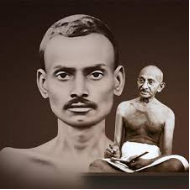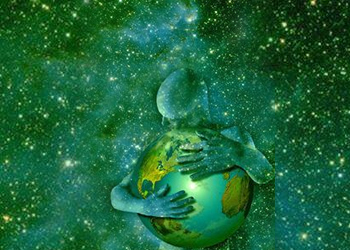
Compassion is an experience of embracing vulnerability and reclaiming our inner strength and resiliency. The pre-requisite is self-awareness and self-connection.
Compassion is awakening our forgotten power, our own strength, our own identity, and not being tamed by false beliefs and ideas that compassion is sparing a dollar for the homeless or the less fortunate. Compassion is about nullifying the negative feelings and fear in our heart and mind and experiencing the one life that flows through us all.
Compassion is to envision a world based on restoring the mysterious endless flow of energy and resources, through generosity and willingness, a deep care for all that lives and all that supports living. Compassion is restoring connection with self, other life, and nature through the practice of caring for needs at all levels. This is a radical Jain principle with absolute practical consequences.
Along with women empowerment programs, compassion calls men and people in positions of power and privilege to engage with women in creating a generous web of support around each of the women that she can step into leadership with more capacity to respond to the immense inner and outer challenges they each face.
Compassion as a path and a goal is an invitation not only to embrace feminism and work to liberate female persons around the world, but also to liberate male persons around the world at the same time. As Miki Kashtan says, “Relationally, this means remembering that our relationships are embedded within patterns of separation and scarcity and finding the willingness to remain lovingly engaged even when it’s difficult.” She tells us our compass shall be, “Speaking, always, the deepest truth I know about myself with the most care possible for the other and listening with an open heart to what comes back.”
Compassion calls us to examine our patriarchal ways of being and how we have created patriarchal systems, most importantly capitalism, racism, and colonialism — that which robs all of us of our human dignity, our freedom, our communities, our place in nature, and our capacity to care for all life. Nonviolence and compassion call us to restore the flow of life and to support the creation of a world that supports all life. Let us embody Mahavir Bhagwan’s command, “LIVE and LET LIVE” and strengthen the autonomy and interdependence of all life of every being.
The objective of this article is to outline empowering approaches that support inner and outer balance in order to cultivate compassion in the face of challenges and conflicts. You will learn that resilience is not a trait that people either have or do not have. It involves thoughts, words and actions that can be learned and developed in anyone. You will be introduced to four keys, namely: Self-Reflection, Balance and Perspective, True Self-Confidence, and Genuine Humility.
I was awakened to my power and energy of compassion when upon completion of the Ph.D. program, I received a postdoctoral fellowship at Case Western Reserve University. I was very passionate about healing and understanding the mysteries of how wounds and arthritis can be healed and how degeneration can be slowed down. With good fortune I was in a position to collaborate with a skillful biochemist and an excellent researcher whose guidance I very much wanted. During only the first week of being a fellow, the biochemist became frustrated in one of our discussions and exclaimed, “Hema, are you sure you have a Ph.D.? You don’t seem to be bright!” Hearing those words from someone whom I had admired and having considered myself blessed to be able to heal the world under his guidance and leadership, left me feeling wounded and scared. My identity and my future were in jeopardy. In that moment I considered myself a failure since he was a very renowned scientist; his words were the truth to me. This was a very painful experience. After spending three hours crying and breathing, I was able to return to his office renewed with compassion and said, “Can I spend a few moments in your luminous presence so that I can brighten myself?”
When these words stirred up in my heart, I felt both liberation and renewal. I believe this is how compassion feels and awakens in us. Compassion is said to manifest in embracing the misery of others as our own. Compassion is our innate drive to engage in the good of others.
This has been one of the most exciting and major turning points in my development, igniting a passion for nonviolence and deepening my connection with being a Jain and what Jain practice calls me to become.
Toward the end of the fellowship the biochemist and I had published three papers together. And my continued association with him has meant a great deal to me. After that day, my “Ph.D.” stood for “Psychologically healthy and Delightful”.
1. Self-Reflection and Self-Awareness:

As a becoming Jain, what I have learnt and continue to relearn is nonviolence and compassion begins with awareness, awareness that One Life Flows in all.
By spending time breathing and crying, I allowed myself to have the full experience of the pain and the personalization of the biochemist’s words. The full experience of how we feel, and the awareness of the emotions triggered in such exchanges is great data but not to be used as direction. The direction is our vision.
In that moment the vision was completion of fellowship and building capacity in healing and learning from his expertise. This awareness and alignment to purpose awakened words of wisdom and the longing for connection. I did not react to his judgment of my lacking brightness, but held his longing for power, ease, efficiency, and whatever expectations he might have had of me as a doctoral graduate.
Nonviolent Communication developed by Marshall Rosenberg, and Miki Kashtan’s writings and trainings based on nonviolent communication have helped me understand that compassion is the ability to release and transcend blame and to move towards self-responsibility. Self-responsibility is putting compassion in action by nullifying the negative feelings and fear in our heart and mind and instead experiencing the one life that flows through us all.
This self-responsibility takes two forms. One is the willingness to take ownership of our own feelings, needs, and reactions. The other is the willingness to hold the others who are involved and look for solutions that include the well-being of the others involved.
Compassion can be cultivated with regular self-reflection and self-awareness. It involves taking time to reflect and identifying what we stand for, what our values are, and what matters most to us. It is this clarity that enable us to engage and move with the flow of life within us and in others when we are in conflict. Not stay stuck in what is happening but to keep oriented to the vision and move towards what I want.
2. Balance and Perspective:
Balance and perspective means having the ability to see situations from multiple perspectives to gain a holistic understanding. One of the most important doctrines and gifts of Jainism is Anekantwad, or the principle of plurality of viewpoints. It is central to the idea of tolerance and mutual respect. Each person has a perception of the world, which is a mix of both truth and ignorance. These perceptions are valid but are incomplete views of reality. The concept of Anekantwad is usually explained with the aid of the parable of seven blind men and an elephant. The story demonstrates that truth can be visualized from seven angles and these views of truth are mere additions to the human knowledge. When viewed together, they present the picture of universal reality.
Our present challenge is that we live in a world of polarities and differences. Yet, as we are interdependent, we have to live together. Anekantwad can be used to facilitate respectful conversations and dialogues when we run into the blind men (represented in the story), who seem to appear in our lives and promote division and injustice, betraying the very ideals and teachings that lie at the heart of nonviolence and compassion.
As we begin to chart our course of existence on the basis of Anekantwad, we must master the art of choosing. We make choices and decisions from the most day-to-day mundane to those forks-in-the-road choices which have great consequences. If we can be guided by the principle of Mitti me savva bhuveshu (Universal Friendliness), the process of making a choice can be made easier. Practice of this principle requires learning to recognize that SPIRIT (atman/soul) is an invisible force also made visible in the blind men we encounter in our daily lives.
The practice of friendship is a necessary beginning to recognize and practice nonviolence and develop the quality of wholesome life prescribed to us by the Jinas.
Cultivating compassion is the ability to identify tools to embrace polarities with confidence and care.
3. True Self-Confidence:

True self-confidence means recognizing your strengths and weaknesses and focusing on continuous integration. True self-confidence is the inner quality that allows us to access our inner power of compassion. True self-confidence is a byproduct of self-awareness and introspection. It is knowing the qualities and tendencies that prevent us from being compassionate and forgiving.
The ability to forgive someone simply means you are letting yourself off of their emotional hook, and that you can have full and easy access to your own love, peace, and presence. Forgiveness is a practice integral to cultivating compassion and taking compassionate action at any cost. And like meditation, it needs to be cultivated and practiced regularly. Forgiveness saves spiritual, physical, and emotional well-being — and relationships — from the corrosive damage of anger and the high cost of hatred and revenge.
Many are not aware that the great champion of nonviolence Mahatma Gandhi was influenced by Shrimad Rajchandraji, particularly in the development of his idea of non-violence as a political instrument. The revered Shrimad Rajchandraji said that forgiveness is the doorway to liberation.
Self-confidence is our awareness of ego and pride and understanding where it prevents us from being vulnerable, because we want to appear strong and superior. Instead, we need to notice our feelings of hurt, the reasons why we were hurt, and which of our values were not honored. Awareness is key in building self-confidence and knowing our self when we feel hurt and upset with others.
Compassion is not about brushing away an insult or harsh words by saying “that’s okay” or “not a problem.” The hurt just gets buried and resurfaces later. Unresolved issues get stored in our tissues and manifest in many forms, such as disease, colds, blisters, pimples, and so on. Self-confidence will encourage us to have a talk with someone close, share the inner hurt, and find a healthier perspective on what happened. My spiritual teacher Pujya Rakeshbhai Jhaveri’s words resonate in my ears when I struggle to show up in compassion with my siblings and friends, by saying “Tame paripurna cho. Bija ni anukampa karo,” which means remember you are whole and complete, so show compassion to others — you have the capacity that needs to be exercised in such moments.
Self-confidence is being aware of our tendencies for revenge — how we respond to others can guide how others act towards us. People will attack or harshly criticize us to let out their own steam, because they have had an awful day or week, or simply do not like their lives that much. So, do not think it is all about you. We do not need to add to their misery by reacting to their reactions.
Cultivating compassion will build awareness that we are hurt not because of others’ actions but because of our needs for respect, love, and possibly connection. We need to release others from blame and wrongness by focusing on what matters most to us, and then by giving that to our self. We need to give our self the love and care that we wish the other person would give to us. The thought of revenge stems from a deep need for empathy. We need to give our self-empathy or ask someone else to give us empathy for what happened. If we wish, we can honestly say, “I felt like this (fill in the blank) when you said or did this not as an evaluation or wrongness of the other but observations of what they said or did (fill in the blank)” and then sharing the needs or the longings (fill in the blank) that were not attended to and what would you like them to do now about it (request). The simple sharing of impact of others actions with out blame can support build trust and renews ways of connection and communication with you. Just saying this can support a conversation where we can connect with what happened inside of us and permit them to see how they contributed to our pain, or how their actions had an impact on us. This sharing of vulnerability can foster trust in relationships.
Compassion is not waiting for the other person to come to us first and say they are sorry. This rarely if ever happens. We wind up spending much of our days thinking about what other people should and should not have done to us. Our focus is on the other person and how wrong they were, and we wait, brooding and wishing they would come and say sorry. This is a great recipe for misery and chronic depression. It is important to connect to our strengths, our goals, and how we want to show up in the world instead of giving the offender the power to define who we are and will be. Compassion can invoke the ability to let go of our focus on a person’s wrongdoings or hurtful words and instead re-channel our energies to wishing them well. This helps us see the situation “as-is,” not “what I want it to be.” And ask ourselves, “What is one small step I can take today to find peace within myself?” We may be guided to journal, meditate, pray, or go exercise.
Compassion gets stagnated when we say, “I can’t let go of the hurt.” This is a very common block to the flow of compassion. We relive the incident over and over in our mind and either get angry or depressed. Cultivating compassion can be enhanced by paying attention to the 12 Jain Reflections (bhavanas), which teach us to acknowledge that we live in and are surrounded by an imperfect world. We certainly see that imperfection every day and, in every way, but a good understanding of these 12 bhavanas allow us to forgive the smaller daily dramas with much greater ease. The bhavanas also point us to our true nature, our peaceful, powerful soul and how to make life choices from that awareness and connection.
Once we understand this and stay aligned to our divine nature, it is easier to forgive and offer our forgiveness as a gift to someone, because that is how our Tirthankars have modeled to us and encourage us to remain in equanimity aligned to our compassionate nature.
Cultivating compassion requires a daily practice of pratikram to release our self of any hurts big and small. It builds awareness that will allow us to live and let others live and helps us realize that every person has the right to be who he or she is.
4. Genuine Humility:
Genuine humility is key to cultivating compassion, which is a needed skill to appreciate interdependence, value all life, and treat it with reverence.
Humility also requires high levels of self-awareness to notice and introspect the many places inside us that are regularly trying to ‘Prove Worth’ instead of ‘Provide Value.’
Gandhiji posits that, “The spirit of nonviolence necessarily leads to humility.”
Self-awareness deepens the clarity of the fine line between ego and humility.
Jainism alerts us that anger, ego, deceit, and greed are the soul’s impurities. Greed is a big one. The ego loves to wrap itself around materialistic ideas. It makes us desire objects, hoping to gain status, admiration, and envy through them. Money itself becomes an end. “It’ll make you happy,” the ego wrongly believes. The similar desire for power is of course also pure ego.
Jains believe that the vast majority of the world’s suffering is caused by the ego, as you can imagine. ‘Ego’ is something to avoid, to work to free ourselves from. It interferes with our spiritual sense of well-being, gets in the way of generosity, and keeps us focused on ‘narcissistic’ desires, such as recognition or being seen.
Living in alignment with the virtue of compassion means living in alignment with the Atma, or in connectedness with one’s SELF, where there is no ego present.
The Jain Tirthankars are known to have achieved a high status and are the epitome of compassion, having freed themselves from fear and ego. The prescribed practices, like Samayik and Pratikraman, are to build awareness and experience our own invulnerable Atma, which is described to have an infinite capacity for compassion and love.
Humility is then the ability to be compassionate in the face of hate, offer empathy and understanding in the face of confusion, and offer compassion in the face of conflict. Nonviolence then becomes an embodiment of courage and a benevolent presence in the world of conflict and confusion.
The practice of Jainism is the art of unlocking the full potential of Love and compassionate action. The responsibility to do so exclusively belongs each one of us.
Most of us see an absence of humility in our past administration and its effects on humankind. It is time for all to awaken to our capacities of Love and Wisdom within and put them into action by protesting and shouting out our visions instead of our fears.
Daily, we live in an inner battle of pride versus humility, which is really just a war against two halves within ourselves. It is you versus you. We are the only enemies against our inner greatness — against our humility.
Can you imagine for a moment a world where the word ‘ego’ has lost its meaning? This would give us full access to the beauty of our hearts and minds, which are instruments of great cognitive and emotional capacity in the service of all life.
Can you imagine a world where collaboration and sharing are both easy and effective? A world where conflicts move towards loving connections and relationships. The joy of enriching and contributing to life becomes everyone’s joyful occupation — that is the world we could create if we transcend our ego and become loving and compassionate human beings.
References:
- Essence of Jaina Scriptures: Pravachanasara of Kundakunda with Tattvadipika Commentary by Amrtachandra Suri. Edited with an introduction by Jagdish Prasad Jain.
- That Which Is-Tattvartha Sutra-Umasvati. Translated by Nathmal Tatia
- Nonviolent Communication-Marshall Rosenberg
- Reweaving Our Human Fabric: Working Together to Create a Nonviolent Future-Miki Kashtan



This article is very well narrating meaning and application of Compassion in day to day life of any Individual. From Self awareness to interdependence she has covered all aspect of life as an individual, as a Parent and as a Employer or Employee how one has to live balance life with Confidence
Superb Article! Spirotually redlective and inspiring.
Excellent article thank you! It is a lot to digest. I will hold onto it and gradually, hopefully, integrate it into my consciousness. This is important work!
Your point of view caught my eye and was very interesting. Thanks. I have a question for you.
Your point of view caught my eye and was very interesting. Thanks. I have a question for you.